Tokyo Olympics: Catharine Pendrel charts a new path to Japan
Twice world champion, the new mother shares her experience racing with a newborn daughter in tow
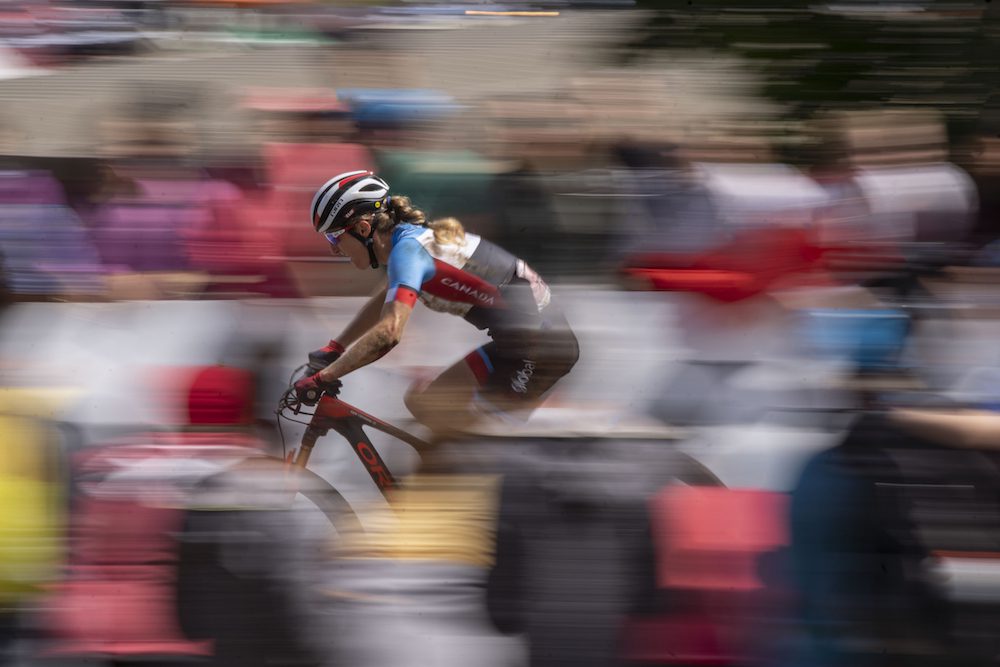 Photo by:
Nick Iwanyshyn
Photo by:
Nick Iwanyshyn
When Catharine Pendrel lands in Tokyo, it will be her fourth Olympic Games. It will still be a new experience for the veteran racer, already a two time world champion and Olympic medallist, though. This Games will be Pendrel’s first as a mother.
Pendrel, gave birth to her first daughter, Dara, early in 2021. Her comeback to racing since has been a major story line of the 2021 World Cup season.
Unlike prior games, where the Kamloops, B.C. athlete carried the weight of expectations, racing as world champion in 2012, just making it to Japan as a new mother is a remarkable achievement. Not that Pendrel is slowing down. Over the course of this season’s four World Cups, the Clif athlete worked her way back to the edge of the top-20 in an incredibly deep women’s field. All while racing with her husband and coach, Kieth Wilson, and newborn daughter Dara along for the ride.
I talked to Pendrel at home in Kamloops, as she was trying to convince her jet-lagged newborn to sleep. It’s where the decorated Canadian racer is completing her last training before leaving Dara and Kieth at home to compete in Tokyo.
Canadian MTB: This is your fourth Olympics. How does that experience help going into Tokyo? Especially coming out of a year that’s been full of uncertainty.
Catharine Pendrel: I think it helps a lot. I’ve figured out, kind of through trial and error the energy that you need around an Olympics, or what can be detrimental. So I’ve been able to keep pretty relaxed through this whole thing. I’ll still be really excited when we get there and be able to enjoy that positive energy. But I’ve also had practice at being adaptable and knowing that everything doesn’t have to be perfect in your lead up in order for you to have a good day. You can plan for everything to be perfect and it can still go sideways, so you just have to be able to with the flow.
You’re going into Tokyo with two Canadian teammates, Haley Smith and Peter Disera. Will you all be able to work together at the course?
Absolutely. In Rio we did a really good job of working together. I know with Haley and Peter that we’ll have really good energy. Even in Les Gets, Peter did a lap with us and it was super helpful. He had gone out and learned some lines already and it just sped up our learning.
The three of us went to Tokyo in October of 2019, so we’re familiar with the course. But with two years away from it it will be nice to get on course together and pool our memories of what works best on course and get up to speed faster.
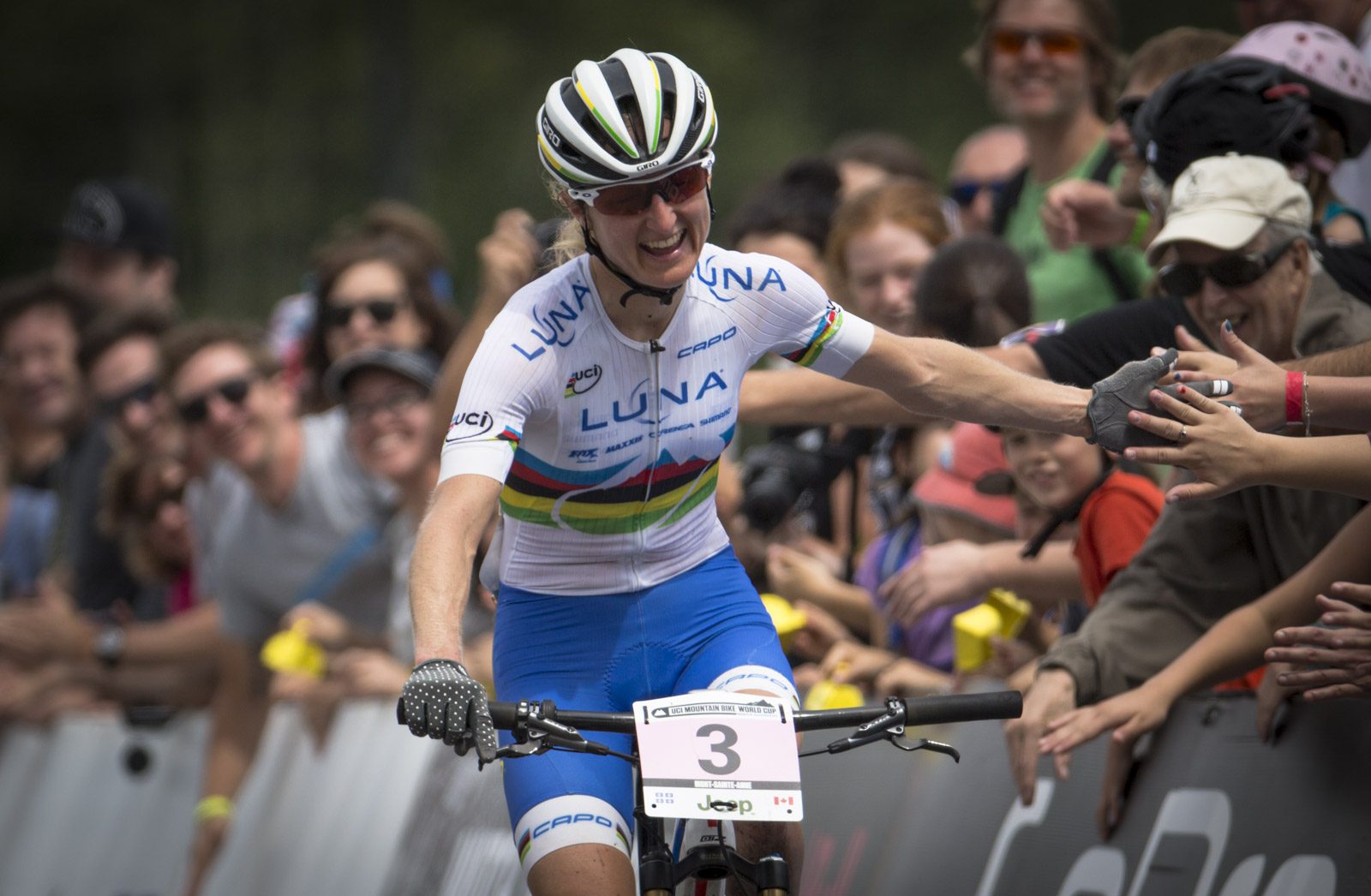
This Olympics has already been a pretty significant Olympics for athletes that are also mothers. With Kim Gaucher and Mandy Bujold. Goucher’s case allowed for newborns to attend the Tokyo Olympics. Will that affect your family at all?
Well, no, not at this point. With a newborn, you can’t just prepare on the fly, you have to have a plan in advance. Even when she was younger, we were thinking “Ok, I may be physically ready to go to the Olympics, but it may not work for us as a family if she can’t have a bottle” or whatever else you’re dealing with with a child at that point. But things have gone really smoothly so we’re very confident with her and Keith staying in B.C. and her going to the grandparents.
Honestly, they’ll have a better 10 days than they would if they went to Tokyo. They’d be having another time zone change and possibly be stuck in a hotel. I know our movements are going to be super restricted while were there. So I imagine for people accompanying us it’ll be even more so. They’re going to enjoy B.C. and watch the race on T.V.
Between Gaucher and Bujold, that’s two major decisions forcing sports governing bodies to treat athletes as more complete humans, not just athletes. How does that impact sports going forward?
It’s really awesome for female athletes thinking about when to have a child and how that can blend in with their sports career. Most women retire and then have a child. Now we’re seeing these opportunities where sponsors are supporting women through pregnancy and postpartum, and selection criteria and sport governing bodies are supporting women in the same way.
It’s one of those things where its obvious once the issues have been brought to the attention. But you don’t have to wait to have women in those positions to recognize the need for those changes. I know USA Triathlon and Tennis are now freezing ranking for women that are pregnant, so you can take time off for your pregnancy and not be at a starting disadvantage.
That’s essentially the opportunity that I had with the Special Provisions Ranking* because of the pandemic. My start position wasn’t hurt by the fact that I didn’t compete at those three World Cup events last year. That definitely helped. If I had to be starting this season with zero UCI points it would have added more challenges to what was already a hard comeback.
*Ed: UCI temporarily suspended the accumulation of points in March 2020, due to the pandemic, allowing riders who could not travel to race to maintain their ranking.
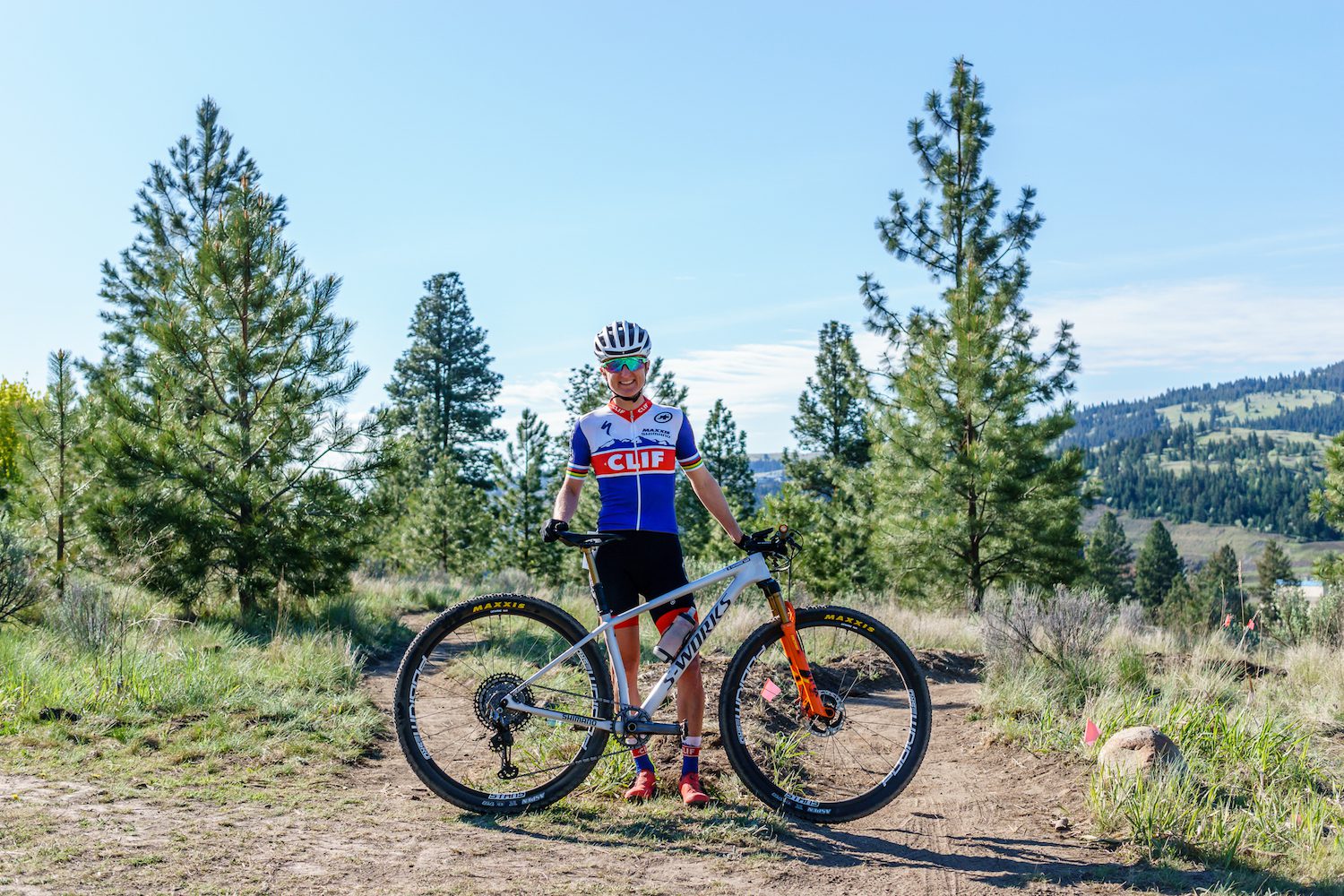
For you, there were at least two major examples that you were following: Gunn-Rita Dahle Flesjå, one of the most successful cross country racers ever, and Elizabeth Brandau.
Gunn-Rita actually announced today that she had another baby through surrogate! So she has another little boy as of this last week.
How important was it to have those women as examples, to see that it could be done successfully?
Yeah, it was really neat. Gunn-Rita was at the top of the world when she had her first child. She had a season the year after having a child where she was racing in the top 60, then 50, then moving back into the top 20s. Seeing what that progression looked like helped garner my expectations and know what was possible. That, deep into her 40s, she was one of the best in the world again was really inspiring. Seeing Brandau competing against the best in the world with two kids was also really neat.
Because I didn’t get to see either of them going through their pregnancy and postpartum period, having more local women like Sonja Looney and Keegan Randall and some other Clif athletes that were going through pregnancy at the same time as me, that was super helpful. You can have real conversations like “what did your training look like” and “what did postpartum look like” and that really helps your confidence and gives you some direction in your pregnancy training.
So for your own comeback, results wise, you were 52nd in Albstadt, and jumped all the way up to 22nd by Les Gets. What was going through your mind after Albstadt?
Ha haaa, after – or even during Albstadt I was like “Woah!” From the power I was seeing in training and the times I was seeing in training, I was expecting to be competing around that top 20 result. Then I was in Albstadt and it was like “Ok, I guess I have to adjust my expectations.” It was probably what everyone else expected but, honestly, I’d expected more.
I was prepared that maybe that was where I was at, but I knew I’d arrived Wednesday night and was already racing by Friday. I was hopeful and optimistic that I was just really fatigued from the travel – and travelling with a baby is very different – and that I just wasn’t able to perform well because of that.
So I skipped the short track in Czech to give myself more rest and was able to place 23rd. That was really exciting. I would have been OK with the 52nd and dealt with that, but I really hoped that I could be a lot stronger. So it was nice to see that I just had to have more time and better preparation to ride well.
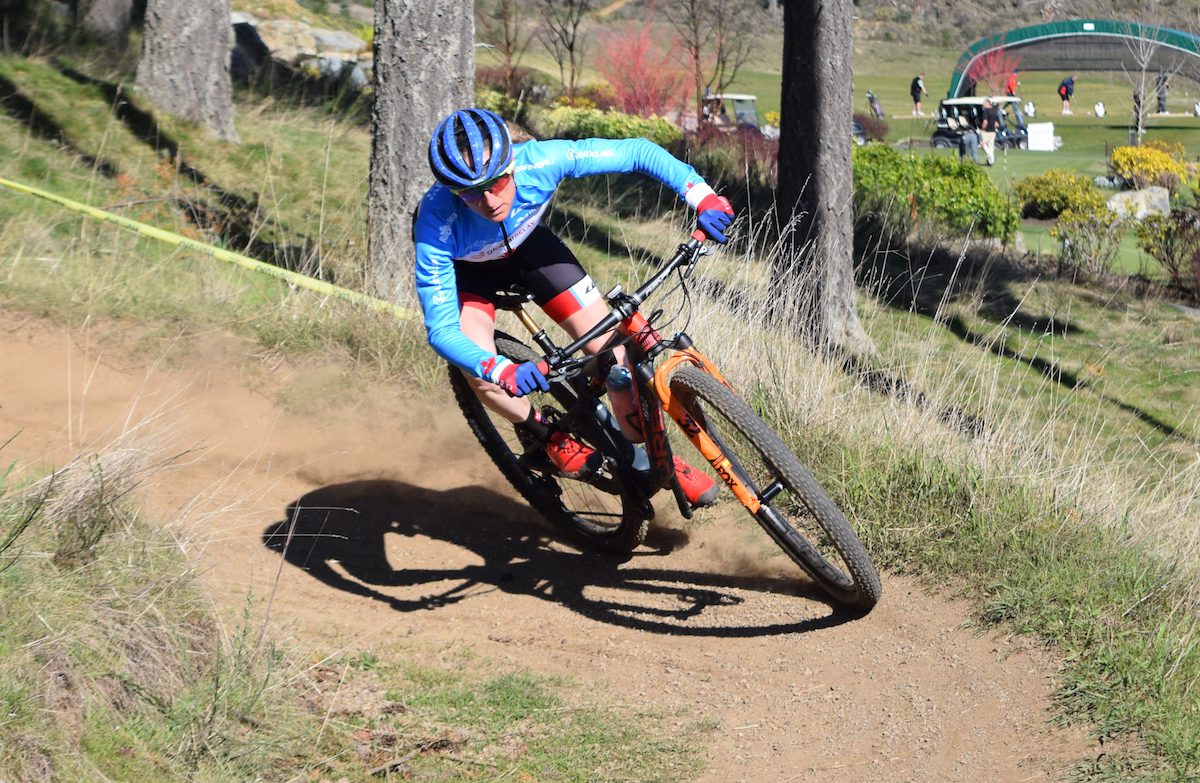
How are you feeling about where you are now, and how your training’s going. Because that’s still a very compressed time period before the Olympics.
Yeah, it is. Getting that 23rd in Czech almost set me up a bit. Like “Ok, 23rd, hopefully I’ll be top 15 by Les Gets, right?” I was able to ride in that top-15 for the first couple laps, but it was just a little bit crazy conditions. It was definitely challenging for our bikes to work properly and us to stay upright, so I didn’t quite have the finish that race that I would have liked. But I saw that my form did improve and my ability to have a good race was there.
It means going into the Olympics without that really strong “I’m going for a medal!” But I’m going to represent Canada as best I can and to represent moms. And hopefully do the best I can to help secure funding for our next Olympic team.
You were travelling to those World Cup’s with the family. That is an impressive undertaking in so many ways. Athletically, logistically, and just the level of commitment that takes from you and the people around you. Were there any unexpected surprises – challenges or positives – along the way?
I guess a positive was that we had rented a camper van for the first few races, then my team had a hotel for me. We were totally prepared that we were going to have to live in the camper so that we didn’t interfere with anyone elses race, just because we weren’t sure how jet lag would go. She travelled so well, though, so we were able to stay in a house. That was much more relaxing than sleeping in a van.
It was more challenging to find the time before Albstadt to mentally prepare for the race. You don’t necessarily have the same quiet time that you would.
But it was really fun. Dara slid into our team environment really well, whether that was with Clif or during the second part, where I was with Jenn [Jackson] and Sandra [Walter]. Yeah, she’s a really fun addition to that, bringing her smiles everyday.
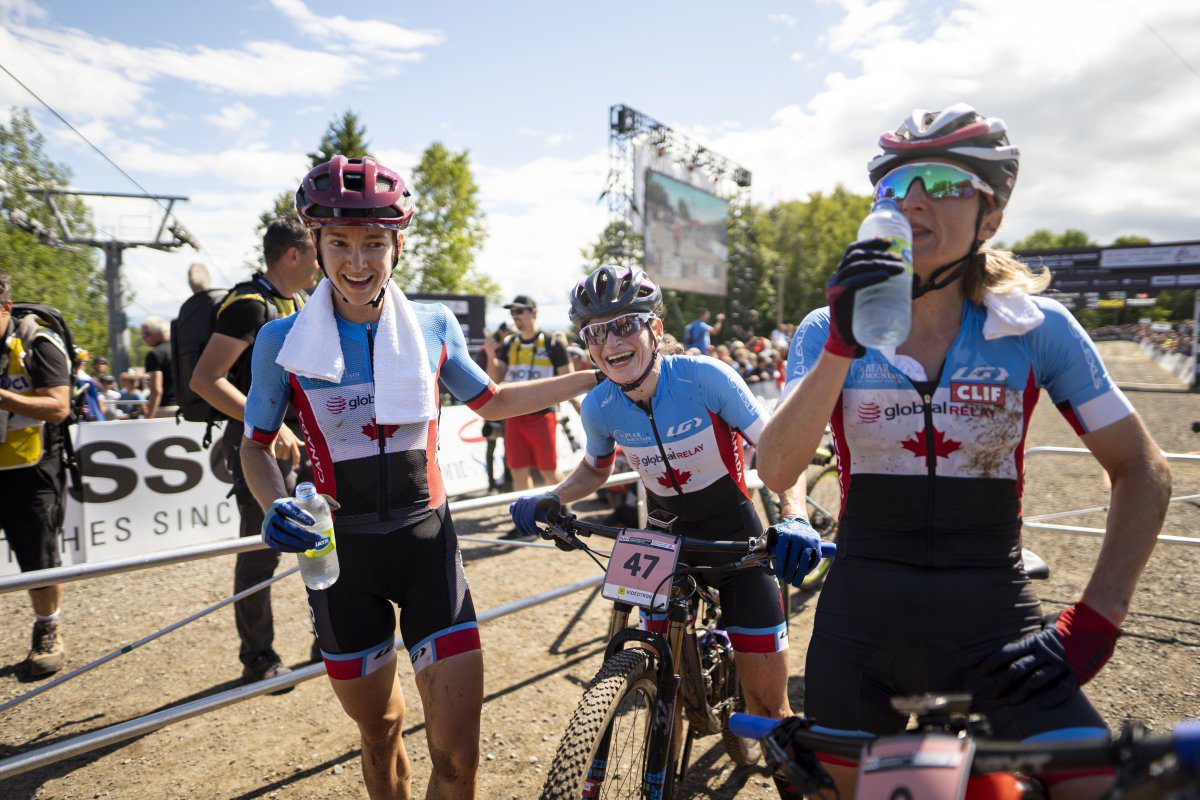
Speaking of Jenn Jackson and Sandra Walter, they’ve also had great results this season. How important is it – to you and to them – to have a group like that to train and race with.
It’s so nice. For years Sandra and I have done pre-riding together. Being able to find someone that you can do your course prep with efficiently, and who gives you confidence so you can learn the course more quickly, is really key. It was fun adding Jenn to that mix. With her cyclocross background she provides a different perspectives.
That was a really fun dynamic. It makes it feel like you’re not just out there to do a bike race. You’re supporting each other to have a good race,too.
Pregnancy are postpartum are very different for every individual. Do you have any advice for any other athletes – of any level – looking to get back into sports post pregnancy?
I’d say just be patient with yourself. Know that you are going to feel like you’ve lost a lot of fitness initially, but it will come back quickly when your body is ready. Just listening to your body and progressing at the speed that is right for you, I think you’ll be able to come back quite quickly and surprise yourself.
Normally I wouldn’t ask an athlete what’s next before a major competition but you’ve been quite clear this is your last World Cup season and Olympics. So what’s your – and the family’s plan after Tokyo?
I don’t 100 per cent know, ha ha. I’ve talked to a couple of teams about different ideas. I’ve been working on getting all my coaching certifications. So I’m leaving it a bit open, especially until after Tokyo. I’m sure I’ll be involved with cycling, but I’ll be spending some quality time with Dara next year. I’m just trying to figure out the balance once my husband goes back to work, and what that looks like.
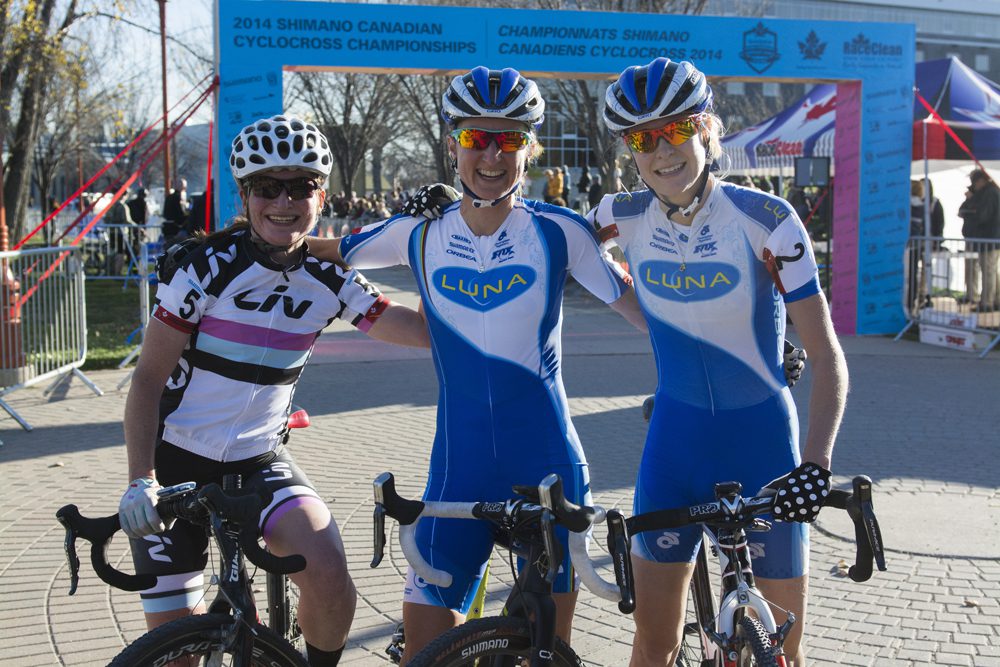
So Clif won’t be a team next year at all. They’ve been a big part of your career. They were around for 20 years, though, so it can be easy to forget just how important that team was when it started. What impact do you see that team having?
We were originally founded because the owner of Clif Bar wanted to create opportunities for women in sport that were equal with what men have. He had a daughter and he wanted her to have strong role models in sport. I really benefited from that program. When I was coming up, seeing the Luna team warming up at races, they were the pinnacle of what you could do in sport, male or female. They were so talented and so successful. It was a dream team, one that I got to become a part of. I feel like they were roll models in the cycling industry and a source of inspiration.
There are, I think a lot of opportunities for women now. It’s not fully equal yet for salaries. But I think investing in women and having so many sponsors that stuck with us that entire time, it really sends a message about the importance of supporting women equally. I think we did a good job of showing what could be accomplished with that level of support.
It’s sad to see that team not continuing. They’ve been a staple of the domestic racing scene for so long. But the sport is in a pretty good place, I think, and hopefully other teams will take up the mantle.
The Olympic men’s and women’s cross country mountain bike races take place on July 26-27, 2021 at the Izu Mountain Bike Course outside Tokyo, Japan.
